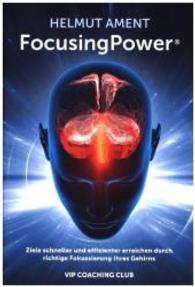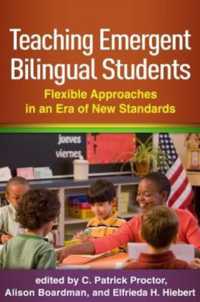Full Description
In the World Library of Educationalists, international scholars themselves compile career-long collections of what they judge to be their finest pieces—extracts from books, key articles, salient research findings, major theoretical and/practical contributions—so the world can read them in a single manageable volume. Readers thus are able to follow the themes and strands of their work and see their contribution to the development of a field, as well as the development of the field itself.
Internationally recognized for his research on environmental education, science engagement, learning outside the classroom, and teacher identity and development, in this volume Justin Dillon brings together a thoughtfully crafted selection of his writing representing key aspects of his life and work leading to his current thinking on the need for a convergence of science and environmental education. The chapters are organized around 7 themes: On Habitus; On methodological issues; Developing theories of learning, identity and culture; Challenges and opportunities—science, the environment and the outdoors; Classroom issues—the emergence of Science|Environment|Health; Science engagement and communication; Science, environment and sustainability.
Contents
Contents
Preface
Introduction
Section 1: On Habitus
Dillon, J. (2007). An organic intellectual? On science, education, and the environment. In, K. Tobin and W.-M. Roth (eds), The Culture of Science Education. Its History in Person. Rotterdam: Sense Publishers, pp. 311-322.
Dillon, J. (2002). Managing teacher development: the changing role of the Head of Department in England. In, P. Fraser-Abder (ed.), Professional Development in Science Teacher Education: Local Insights with Lessons for the Global Community, Taylor and Francis, pp. 172-186.
Meyers, R.B., Brody, M., Dillon, J., Hart, P., Krasny, M., Monroe, M., Russell, C., & Wals, A. (2007). Towards creating an inclusive community of researchers: the first three years of the North American Association for Environmental Education research symposium. Environmental Education Research, 13(5), 639-661.
Clark, C., Brody, M., Dillon, J., Hart, P., & Heimlich, J. (2007). The messy process of research: dilemmas, process, and critique. Canadian Journal of Environmental Education, 12, 110-126.
Bevan, B., & Dillon, J. (2010). Broadening views of learning: developing educators for the 21st Century through an international research partnership at the Exploratorium and King's College London. The New Educator, 6, 167-180.
Section 2: On methodological issues
Dillon, J. and Wals, A. (2006). On the dangers of blurring methods, methodologies and ideologies in environmental education research. Environmental Education Research, 12(3/4), 549-558.
Dillon, J., & Reid, A. (2004). Issues in case study methodology in investigating environmental and sustainability issues in higher education: towards a problem-based approach? Environmental Education Research, 10(1), 23-37.
Section 3: Developing theories of learning, identity and culture
Dillon, J., Kelsey, E., & Duque-Aristizábal, A. M. (1999). Identity and culture: theorising emergent environmentalism. Environmental Education Research, 5(4), 395-405.
Dillon, J., & Teamey, K. (2002). Reconceptualising environmental education - taking account of reality. Canadian Journal of Science, Mathematics and Technology Education, 2(4), 467-483.
Dillon, J. (2003). On learners and learning in environmental education: Missing theories, Ignored communities. Environmental Education Research, 9(2), 215-226.
Section 4: Challenges and opportunities - science, the environment and the outdoors
Dillon, J., Rickinson, M., Teamey, K., Morris, M., Choi, M. Y., Sanders, D., & Benefield, P. (2006). The value of outdoor learning: evidence from research in the UK and elsewhere. School Science Review, 87(320), 107-111.
Dillon, J., Rickinson, M., Sanders, D., & Teamey, K. (2005). On food, farming and land management - towards a research agenda to reconnect urban and rural lives. International Journal of Science Education. 27(11), 1359-1374.
Dillon, J. and Reid, A. (2007). Science, the environment and citizenship: teaching values at Minstead Study Centre. In, D. Corrigan, J. Dillon, & R. Gunstone (eds), The Re-emergence of Values in the Science Curriculum. Rotterdam: Sense Publishers, pp. 77-88.
Dillon, J. (2013). Barriers and benefits to learning in natural environments: towards a reconceptualisation of the possibilities for change. COSMOS 8(2), 1-14.
Section 5: Classroom issues - the emergence of Science|Environment|Health
Dillon, J., & Gill, P. (2001). Risk, environment and health: aspects of policy and practice. School Science Review, 83(303), 65-73.
Dillon, J. (2009). Approaching 'soft disasters' in the classroom: teaching about controversial issues in science, technology, society, and environment education. In, A. Jones, & M. de Vries (eds), International Handbook of Research and Development in Technology Education. Rotterdam: Sense, pp. 297-306.
Dillon, J. (2009). On scientific literacy and curriculum reform. International Journal of Environmental and Science Education, 4(3), 201-213.
Dillon, J. (2012). Science, environment and health education: towards a reconceptualisation of their mutual interdependences. In, A. Zeyer, & R. Kyburz-Graber (eds), Science|Environment|Health - towards a renewed pedagogy for science education. Dordrecht: Springer, pp. 87-101.
Section 6: Science engagement and communication
Dillon, J. (2011). Science communication - a UK perspective. International Journal of Science Education, Part B: Communication and Public Engagement, 1(10), 5-8.
Kelsey, E. and Dillon, J. (2010). "If the public knew better, they would act better": Challenging the myth of the ignorant public. In, R. Stevenson, & J. Dillon (eds), Engaging Environmental Education: Learning, Culture and Agency. Rotterdam: Sense, pp. 99-110.
Dillon, J., & Hobson, M. (2012). Communicating global climate change: issues and dilemmas. In, J. Gilbert, B. Lewenstein, & S. Stocklmayer (eds), Communication for Engagement in Science and Technology. New York: Routledge, pp. 215-228.
Section 7: Science, Environment and sustainability
The final section sets out my position on the relationship between science, the environment and sustainability. #22 is a critique of simplistic thinking about the relationship between science and environmental education. #23 is a critique of education for sustainable development. #24 lays out my current thinking on the need for a convergence of science and environmental education.
Dillon, J. (2005). 'Silent Spring': Science, the environment and society. School Science Review, 86(316), 113-118.
Dillon, J., & Huang, J. (2010). Education for sustainable development: Opportunity or threat? School Science Review, 92(338), 39-44.
Wals, A.E.J, Brody, M., Dillon, J, & Stevenson, R.B. (2014). Convergence between science and environmental education. Science, 344, 583-4.
Final thoughts








